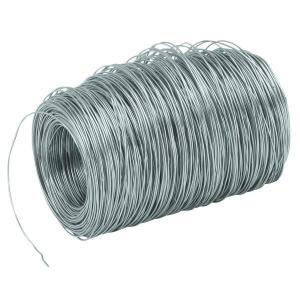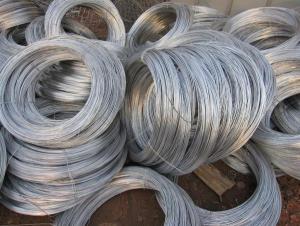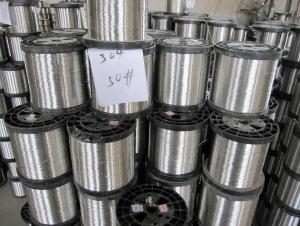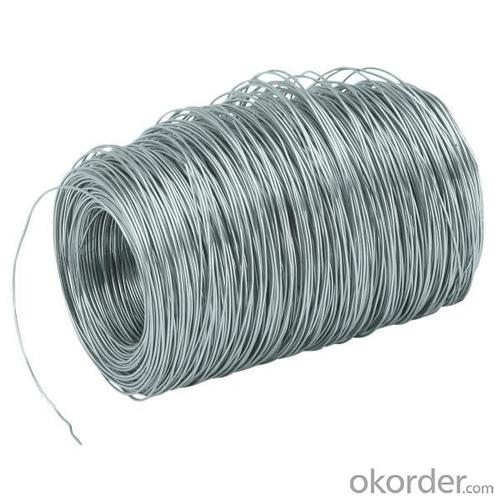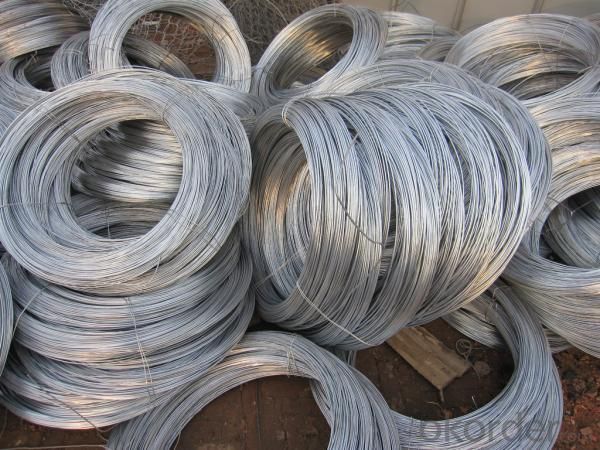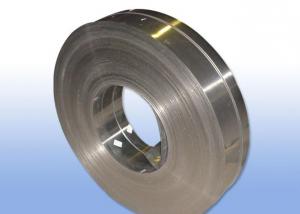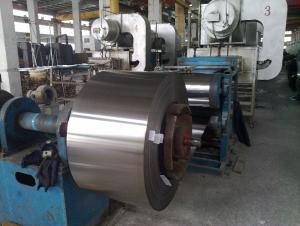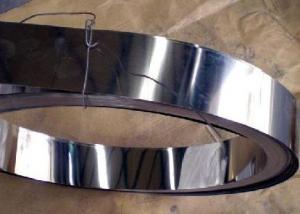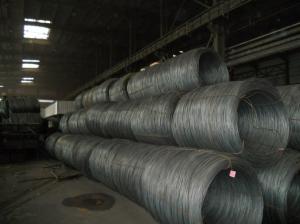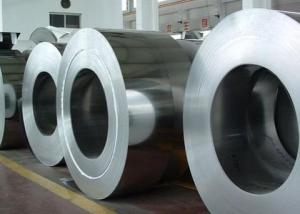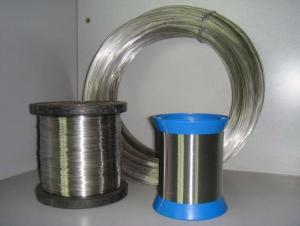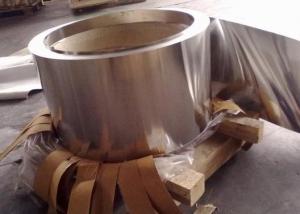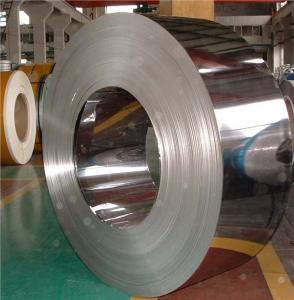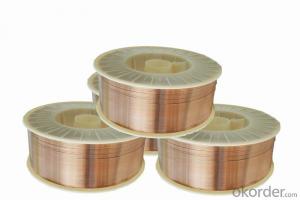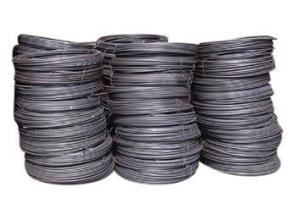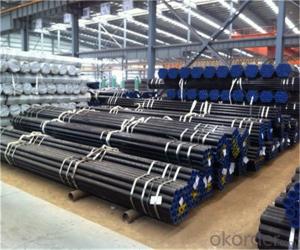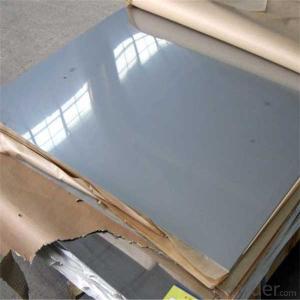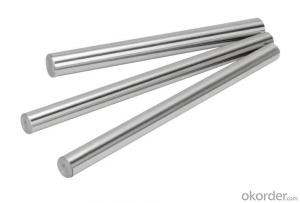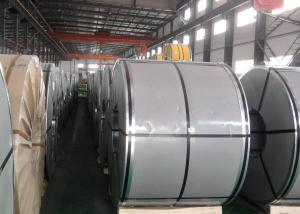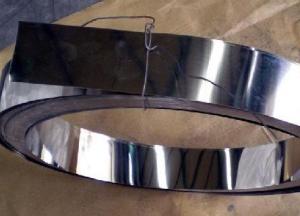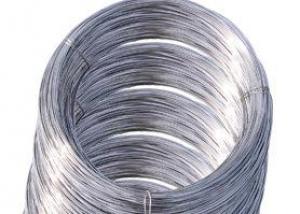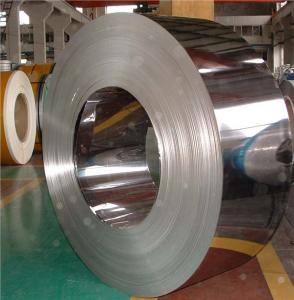Best sell For AISI304 Stainless Steel Wire
- Loading Port:
- China Main Port
- Payment Terms:
- TT or LC
- Min Order Qty:
- 500 KGS m.t.
- Supply Capability:
- 2000 Tons Per Month m.t./month
OKorder Service Pledge
OKorder Financial Service
You Might Also Like
Best Sell For AISI 304 Stainless Steel Wire
Application Of Best Sell For AISI 304 Stainless Steel Wire
With bright surface, slight magnetism and no cracks on forming, is widely used in bicycle fittings, kitchen and sanitation tools, goods shelf, pet cages, gill racks, decorative handles and baskets, food and medical machinery accesses, etc.
General Information Of Best Sell For AISI 304 Stainless Steel Wire
Grade | SS 200,300,400 series |
Dia | 0.1mm-100mm |
Length | 500m-2000m/Reel |
Surface | Bright |
Certificate | Fortune 500, SGS, ISO 9001:2008 |
Test | Salt Spray over200 hours |
Delivery | Within 20 days |
Packing | Reel, wooden box or according to your requirement |
Payment terms | China Main Port or CIF ANY PORT |
Application | Tie wire, pins, lashing, forming wire, filters, gaskets, elevators, safety wire, shaped and flat wire, conveyors, jewelry, springs, brush welding, electrical, wire line, craft and many more applications. |
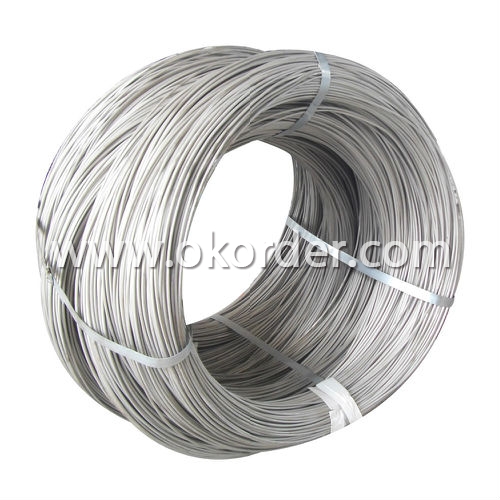
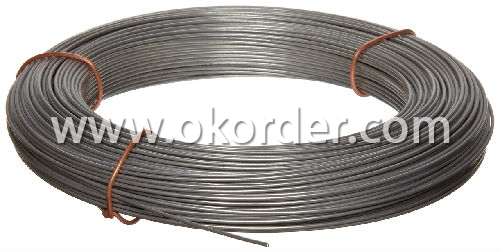
- Q: What are the different types of stainless steel wire rope terminations?
- There are several different types of stainless steel wire rope terminations, including swaged fittings, hand-crimped fittings, mechanical fittings, and wire rope clips. Swaged fittings involve compressing the wire rope using a hydraulic press to create a permanent termination. Hand-crimped fittings involve manually crimping the wire rope using a crimping tool. Mechanical fittings use a combination of mechanical devices, such as screws or bolts, to secure the wire rope. Wire rope clips involve using a U-bolt and saddle to clamp the wire rope together.
- Q: How is stainless steel wire manufactured?
- Wire drawing is the method utilized to manufacture stainless steel wire. This technique comprises pulling a stainless steel rod or billet through a succession of dies to decrease its diameter and increase its length. To commence the manufacturing process, the appropriate grade of stainless steel must be chosen, which may differ depending on the desired wire properties. The most common grades are 304, 316, and 430 stainless steel, each possessing distinct compositions and characteristics. Once the stainless steel rod or billet is selected, it undergoes a cleaning and lubrication process to facilitate the wire drawing. This aids in reducing friction and heat generation during the drawing operation. The subsequent step involves passing the stainless steel rod or billet through a series of dies, usually made of tungsten carbide or diamond. These materials possess extreme hardness, allowing them to shape the stainless steel without causing excessive wear. Each die in the series has a slightly smaller diameter than the previous one, resulting in the stainless steel being drawn through progressively smaller openings. As the stainless steel passes through each die, its diameter decreases and its length increases. This process is repeated several times until the desired diameter and length of wire are achieved. Throughout the wire drawing process, the stainless steel wire is periodically annealed to relieve internal stresses and enhance its ductility. Annealing involves heating the wire to a specific temperature and then slowly cooling it. This process improves the wire's mechanical properties and makes it easier to work with. Once the stainless steel wire reaches the desired diameter, it undergoes further processing to eliminate any surface defects or imperfections. Typically, this is accomplished through pickling, which involves immersing the wire in an acid solution to remove any oxide layers or scale that may have formed during manufacturing. Following pickling, the stainless steel wire may undergo additional processes such as coating or heat treatment, depending on its intended application. These processes can further enhance the wire's corrosion resistance, strength, or other desired properties. Upon completion of the manufacturing process, the stainless steel wire is typically wound onto spools or reels for storage and transportation. It can then be utilized in various applications, such as construction, automotive, or industrial purposes. In summary, the manufacturing of stainless steel wire combines precision engineering, material selection, and various processing techniques to produce a versatile and high-quality product.
- Q: Can stainless steel wire be used for architectural cable systems?
- Yes, stainless steel wire can be used for architectural cable systems. Stainless steel is a popular choice for architectural applications due to its durability, strength, and resistance to corrosion. It is commonly used in cable systems for architectural purposes such as balustrades, handrails, and tension structures. Stainless steel wire provides a sleek and modern aesthetic, while also meeting the necessary safety requirements. Its versatility allows for various design possibilities, making it a suitable material for architectural cable systems.
- Q: Can stainless steel wire be used for medical instruments?
- Yes, stainless steel wire can be used for medical instruments. Stainless steel is a widely used material in the medical field due to its excellent corrosion resistance, strength, and durability. It is often used for surgical instruments, orthopedic implants, and various medical devices.
- Q: 201 stainless steel 667 and 669 difference
- Stainless steel wire and stainless steel wire, various specifications and models of silk production as raw materials of stainless steel, the origin of the United States, Holland, Japan, the general section is round or flat.
- Q: What is stainless steel wire made of?
- Stainless steel wire is primarily made of iron, carbon, and chromium, with additional elements such as nickel and manganese added for enhanced corrosion resistance and strength.
- Q: What are the different types of stainless steel wire ropes used in elevator applications?
- Elevator applications commonly utilize various types of stainless steel wire ropes. These wire ropes come in different constructions, each offering specific features and benefits. Firstly, there is the 1x19 construction. This particular wire rope is composed of 19 individual strands, with each strand consisting of a single wire. It is renowned for its remarkable strength and resistance to abrasion, making it perfect for heavy-duty elevator applications. Next, we have the 7x7 construction. This wire rope is made up of 7 strands, with each strand comprising 7 wires. It provides excellent flexibility and is commonly employed in elevator applications that require smooth operation and durability. Moving on, there is the 7x19 construction. This wire rope consists of 7 strands, with each strand consisting of 19 wires. It offers exceptional flexibility and is frequently used in elevators with complex movement patterns. Then, we have the 6x19+FC construction. This wire rope is constructed with 6 strands, each consisting of 19 wires, and features a fiber core (FC). The fiber core enhances strength and flexibility, making it suitable for elevators that need to lift heavy loads. Lastly, there is the 6x36 IWRC construction. This wire rope is composed of 6 strands, each consisting of 36 wires, and possesses an independent wire rope core (IWRC). It provides outstanding strength and durability, making it an ideal choice for elevators in high-rise buildings. These diverse stainless steel wire ropes offer varying levels of strength, flexibility, and durability. This allows elevator manufacturers to select the most appropriate option that suits their specific application requirements.
- Q: Is stainless steel wire resistant to kinking?
- Yes, stainless steel wire is generally resistant to kinking. Stainless steel possesses excellent strength and flexibility, making it less vulnerable to kinking compared to other types of wire. Its unique composition, which includes chromium and nickel, provides increased resistance to corrosion, rust, and bending. However, it is important to note that while stainless steel wire is less likely to kink, it is not completely immune to it. Under extreme pressure or improper handling, stainless steel wire can still kink or deform. Therefore, proper care and handling are important to maintain the integrity and longevity of stainless steel wire.
- Q: Is stainless steel wire suitable for architectural mesh applications?
- Yes, stainless steel wire is highly suitable for architectural mesh applications. It offers durability, strength, and corrosion resistance, making it ideal for both indoor and outdoor use. Additionally, stainless steel wire can be woven into various intricate patterns, providing aesthetic appeal and allowing for creative designs in architectural projects.
- Q: What are the different wire tolerance classes available for stainless steel wire?
- Stainless steel wire's various tolerance classes are typically determined by the American Wire Gauge (AWG) system, which categorizes wires based on their diameter. These tolerance classes establish the permissible range of diameter variations for each wire size. In the case of stainless steel wire, the tolerance classes consist of Class 1, Class 2, and Class 3. Class 1 represents the most precise classification, boasting the narrowest tolerance range. It finds common usage in applications that demand utmost precision and accuracy, such as medical devices and aerospace components. Class 2, on the other hand, features a slightly broader tolerance range than Class 1. It is frequently employed in general-purpose applications that prioritize reliable and consistent wire diameters over high precision. Class 3 offers the widest tolerance range among the three classes. It is typically employed in applications where precision is not of primary concern, such as construction or industrial applications. The tolerance classes for stainless steel wire guarantee that the wire's diameter remains within acceptable limits, thereby preserving its mechanical properties and overall performance. It is crucial to note that specific tolerance requirements may vary depending on industry standards or customer specifications.
Send your message to us
Best sell For AISI304 Stainless Steel Wire
- Loading Port:
- China Main Port
- Payment Terms:
- TT or LC
- Min Order Qty:
- 500 KGS m.t.
- Supply Capability:
- 2000 Tons Per Month m.t./month
OKorder Service Pledge
OKorder Financial Service
Similar products
Hot products
Hot Searches
Related keywords
